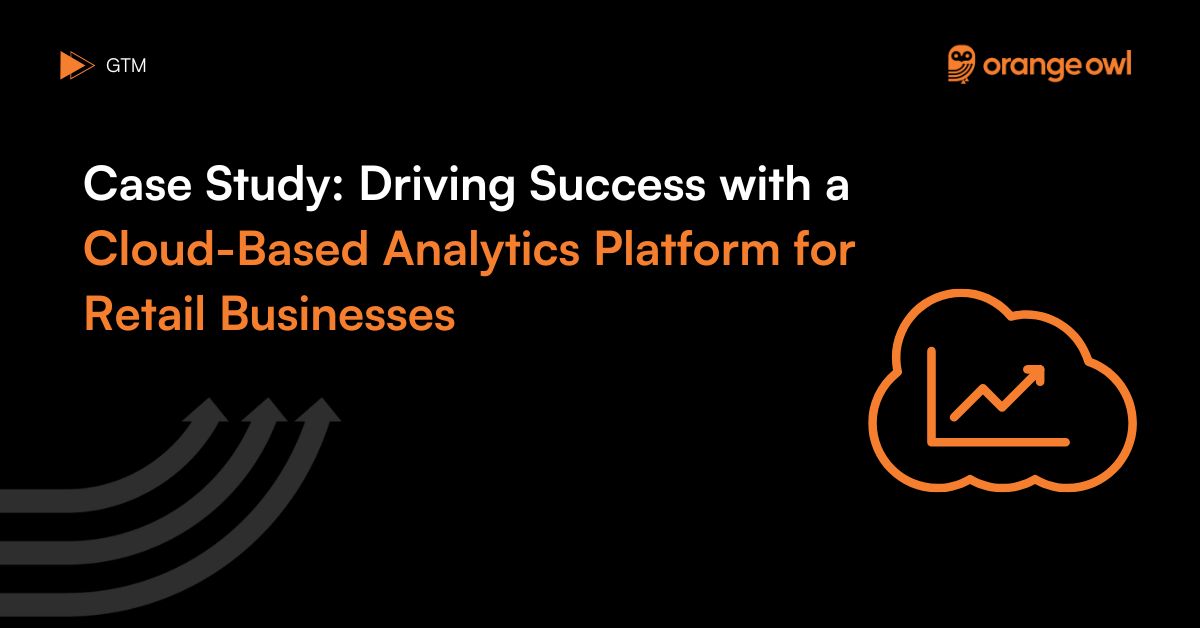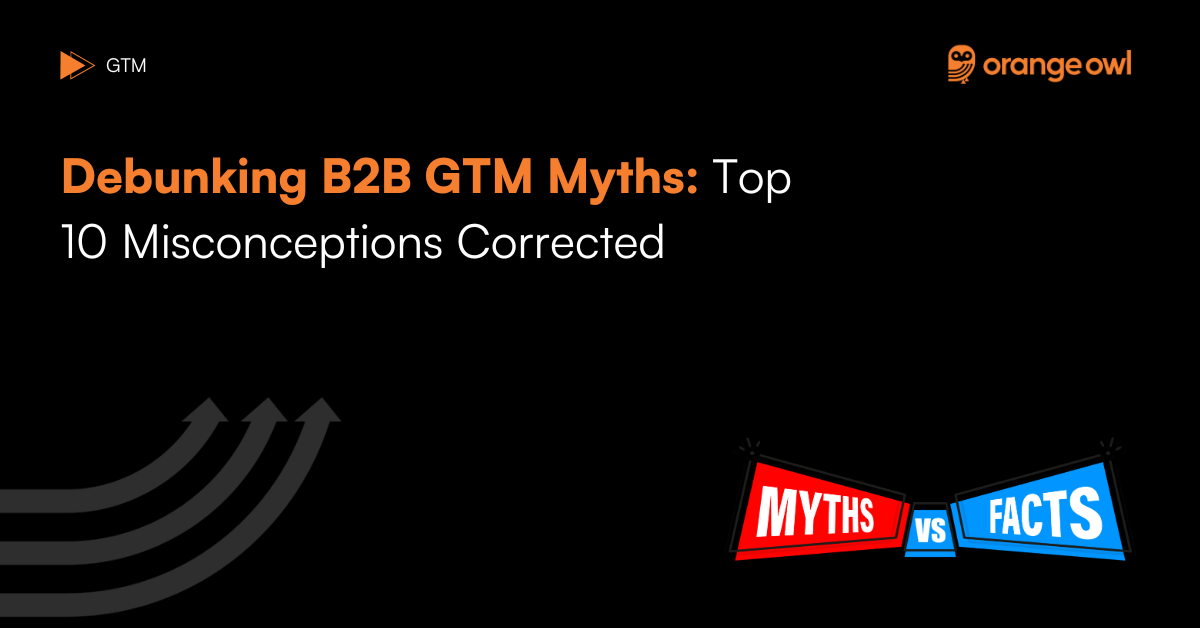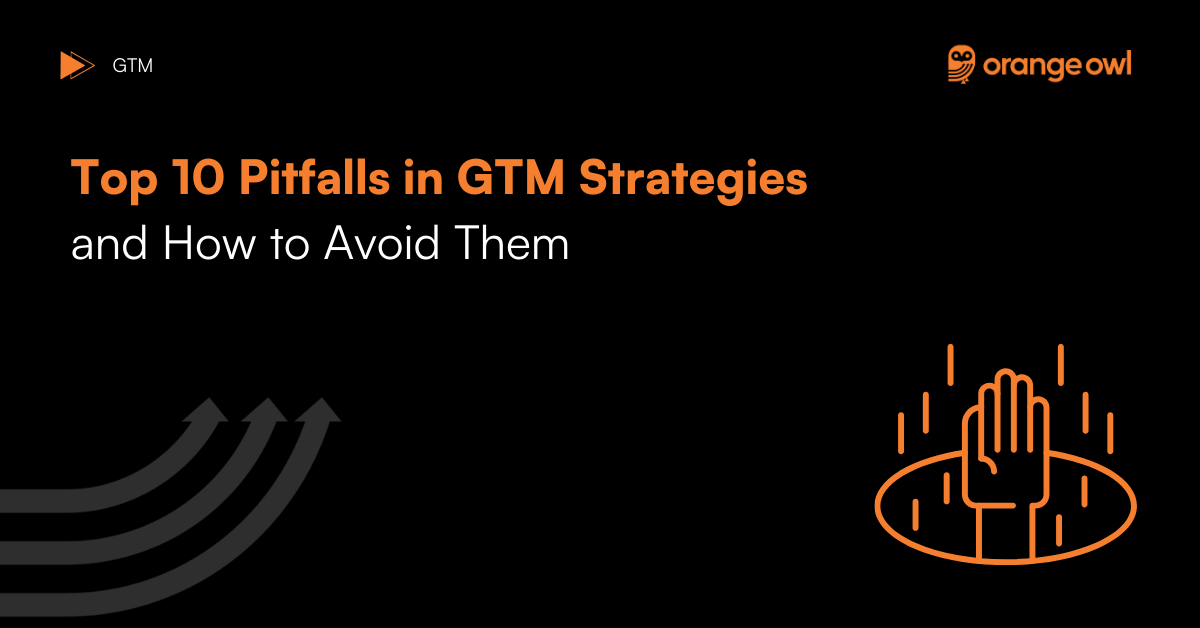GTM Case Study: Driving Success with a Cloud-Based Analytics Platform for Retail Businesses
Orange Owl
May 30, 2024

Table of Contents
GTM Case Study Background
In our GTM Case Study example, we examine the competitive retail landscape, where data-driven decision-making is crucial. A tech startup identified an opportunity to transform inventory management using predictive analytics and real-time insights. Their cloud-based analytics platform promised to empower retail businesses with the tools needed to optimize inventory, reduce costs, and enhance profitability. However, to realize their vision, they needed a strategic Go-To-Market (GTM) approach that would effectively penetrate the market and resonate with their target audience.

GTM Case Study: Challenges
1. Market Competition: The retail analytics space was crowded with established players, making it challenging for a new entrant to gain traction.
- Expert Tip: To differentiate itself in a crowded market, the startup focused on its platform’s unique features and benefits, emphasizing aspects like real-time data visualization, predictive analytics algorithms, and scalability.
- Example: Looker, a data analytics company, faced similar challenges when entering the market. By focusing on their platform’s ease of use and powerful insights, they were able to carve out a niche and compete effectively against larger competitors.
2. Educating the Market: Many retail businesses were still reliant on traditional inventory management methods and needed to be educated about the benefits of data-driven analytics.
- Expert Tip: Content marketing plays a crucial role in educating the market. The startup created blog posts, whitepapers, and case studies highlighting the impact of data analytics on inventory optimization, cost reduction, and revenue growth.
- Example: Tableau, a data visualization company, launched a comprehensive content marketing campaign to educate businesses about the value of data visualization. By providing valuable resources and insights, they positioned themselves as thought leaders in the space.
3. Targeting the Right Audience: Identifying and reaching retail businesses that would benefit most from their platform requires precise targeting and messaging.
- Expert Tip: The startup utilized data analysis and market segmentation techniques to identify high-potential target segments within the retail industry, such as fast-moving consumer goods (FMCG) companies, e-commerce retailers, and brick-and-mortar stores with online presence.
- Example: Salesforce, a leading CRM platform, effectively targeted different industry verticals with tailored messaging and solutions. By understanding the unique needs of each segment, they were able to drive targeted marketing campaigns and achieve higher conversion rates.
GTM Case Study: Strategy
1. Segmentation and Targeting
- Conducted thorough market research to identify segments within the retail industry that were most likely to benefit from data analytics.
- Developed buyer personas based on factors such as business size, industry, pain points, and technological maturity.
- Tailored marketing messages and outreach efforts to resonate with each identified segment, highlighting the specific benefits and solutions offered by the platform.
- Expert Tip: Continuously monitor market trends and customer feedback to refine segmentation strategies and adapt messaging accordingly.
2. Product Positioning and Messaging
- Emphasized the platform’s ease of use, scalability, and ability to deliver actionable insights in real time.
- Leveraged case studies and testimonials to demonstrate tangible results achieved by early adopters of the platform.
- Positioned the platform as a strategic investment rather than just another software tool, focusing on long-term value and ROI.
- Expert Tip: Maintain consistency in messaging across all marketing channels to reinforce key value propositions and build brand recognition.
3. Multi-Channel Marketing
- Deployed a multi-channel marketing approach to maximize reach and engagement, including digital advertising, content marketing, email campaigns, and industry events.
- Partnered with industry influencers and thought leaders to amplify the platform’s visibility and credibility within the retail community.
- Leveraged social media platforms to share educational content, success stories, and industry insights, positioning the startup as a trusted resource in the retail analytics space.
- Expert Tip: Monitor and analyze the performance of each marketing channel to identify high-performing channels and optimize resource allocation accordingly.
4. Sales Enablement and Customer Support
- Equipped the sales team with comprehensive product knowledge and sales collateral tailored to different buyer personas and stages of the sales cycle.
- Implemented a proactive customer support strategy to address inquiries, provide technical assistance, and ensure a seamless onboarding experience for new customers.
- Expert Tip: Leverage customer feedback to identify common pain points and objections encountered during the sales process, and provide sales teams with resources and training to address them effectively.
GTM Case-Study: Results
- Market Penetration: The GTM strategy facilitated successful market entry, allowing the startup to penetrate key segments within the retail industry and gain a foothold in the market.
- Customer Acquisition: The targeted approach to segmentation and messaging resulted in a steady influx of qualified leads and conversions, driving customer acquisition and revenue growth.
- Customer Success: The platform’s ability to deliver tangible value and ROI led to high customer satisfaction and retention rates, with many customers achieving significant improvements in inventory management efficiency and profitability.
- Industry Recognition: The startup gained recognition as a leading innovator in the retail analytics space, earning accolades and industry awards for its groundbreaking platform and impactful contributions to the retail industry.
GTM Case Study: Conclusion
In our GTM Case Study example, by implementing a strategic GTM approach that prioritized segmentation, targeted messaging, multi-channel marketing, and customer-centricity, the tech startup successfully launched and established its cloud-based analytics platform as a game-changer in the retail industry. Through relentless focus on delivering value to customers and continuous innovation, they not only overcame market challenges but also emerged as a trusted partner for retail businesses seeking to unlock the power of data analytics for strategic decision-making and business growth. Listening to customer feedback, adapting to market dynamics, and maintaining a customer-centric mindset were key drivers of their success.


